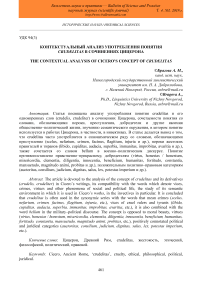Контекстуальный анализ употребления понятия crudelitas в сочинениях Цицерона
Автор: Брагова Арина Михайловна
Журнал: Бюллетень науки и практики @bulletennauki
Рубрика: Исторические науки
Статья в выпуске: 2 т.4, 2018 года.
Бесплатный доступ
Статья посвящена анализу употребления понятия crudelitas и его однокоренных слов (crudelis, crudeliter) в сочинениях Цицерона, сочетаемости понятия со словами, обозначающими пороки, преступления, добродетели и другие явления общественно-политической жизни, изучению семантического окружения, в котором понятие используется в работах Цицерона, в частности, в инвективах. В статье делается вывод о том, что crudelitas часто употребляется в синонимическом ряду со словами, обозначающими преступление (scelus, nefarium, crimen, facinus, flagitium, injuria и др.), пороки жестоких правителей и тиранов (libido, cupiditas, audacia, superbia, immanitas, improbitas, avaritia и др.), также сочетается со словом bellum в военно-политическом дискурсе. Понятие противопоставлено нравственно-прекрасному, добродетелям (virtus, honestas / honestum, misericordia, clementia, diligentia, innocentia, beneficium, humanitas, fortitudo, constantia, mansuetudo, magnitudo animi, probitas и др.), положительным политико-правовым категориям (auctoritas, consilium, judicium, dignitas, salus, lex, potestas imperium и др.).
Цицерон, древний рим, жестокость, этический, философский, политический, правовой
Короткий адрес: https://sciup.org/14111861
IDR: 14111861 | УДК: 94(3) | DOI: 10.5281/zenodo.1173395
Список литературы Контекстуальный анализ употребления понятия crudelitas в сочинениях Цицерона
- Arena V. Roman Oratorical Invective//A Companion to Roman Rhetoric. Ed. by W. Dominik and J. Hall. Oxford: Wiley-Blackwell, 2010. P. 149-160.
- Cicero. Philippics 3-9. Edited with Introduction, Translation and Commentary by G. Manuwald. V. 1: Introduction, Text and Translation, References and Indexes. Berlin: Walter de Gruyter, 2007. 1094 p.
- Cicero’s. De Provinciis Consularibus Oratio. Introduction and Commentary by L. Grillo. Oxford: Oxford University Press, 2015. 368 p.
- Dunkle J. R. The Greek Tyrant and Roman Political Invective of the Late Republic//Transactions and Proceedings of the American Philological Association. 1967. V. 98. P. 151-171 DOI: 10.2307/2935871
- Wirzsubski Ch. Libertas as a Political Idea at Rome during the Late Republic and Early Principate. Cambridge: Cambridge University Press, 1968. 196 p.
- Cicero: "Pro Sexto Roscio". Ed. by A. R. Dyck. Cambridge: Cambridge University Press, 2010. 260 p.
- Devine A. M. A Study of the Aristocratic Ideal and the Theme of Moral Decline in Latin Love Elegy. Thesis for the Degree of Doctor of Philosophy in Classics. Hobart: University of Tasnania, 1978. 404 p.
- Polk G. C. The Helmsman and the Charioteer in the Aeneid: Emblems of Power. A Dissertation for the Degree of Doctor of Philosophy. Athens, Georgia, 2013. 494 p.
- Брагова А. М. Текстологический анализ употребления понятия audacia в трудах Цицерона//Studia humanitatis. 2017. №3 DOI: 10.24411/2308-8079-2017-00004
- Брагова А. М. Цицероновское понятие superbia в римском этико-философском и политико-правовом дискурсе//Бюллетень науки и практики. 2017. №11 (24). С. 405-412. Режим доступа: http://www.bulletennauki.com/bragova-a (дата обращения 15.11.2017) DOI: 10.5281/zenodo.1048710
- Drummond A. Law, Politics and Power. Sallust and the Execution of the Catilinarian Conspirators. Stuttgart: Franz Steiner Verlag, 1995. 136 p.
- Hall J. Cicero’s Use of Judicial Theater. Ann Arbor: The University of Michigan Press, 2014. 202 p.
- Stevenson T. Julius Caesar and the Transformation of the Roman Republic. London and New York: Routledge, 2015. 224 p.
- Van der Blom H. Cicero’s Role Models: The Political Strategy of a Newcomer. Oxford: Oxford University Press, 2010. 420 p.


